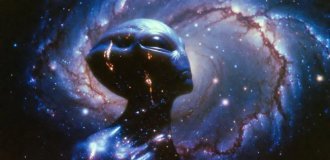Space fever: 6 cult sci-fi series of the 90s that changed our understanding of the genre (7 photos + 6 videos)
These series didn't just show the future, they predicted it. Living ships, intergalactic conspiracies, travel between worlds and aliens among us - all this was in the 90s long before Black Mirror. Let's remember 6 cult projects that made us believe that somewhere out there, among the stars, something incredible is happening. 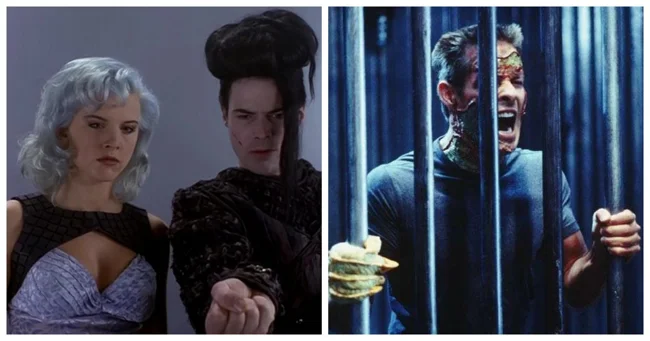
1. "Sliders" (1995-2000) 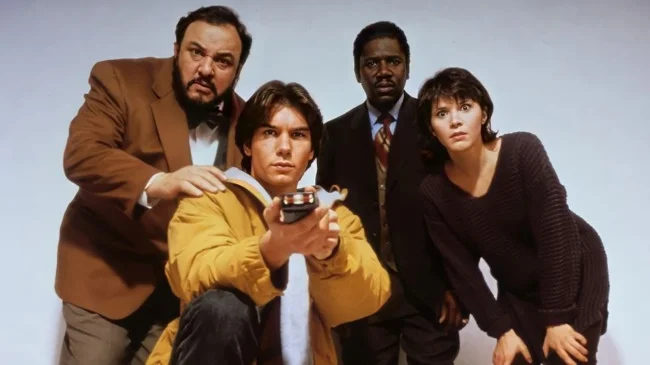
What if around every corner of reality there is another world waiting for you? Brilliant but careless physicist Quinn Mallory (Jerry O'Connell) accidentally opens a portal to parallel universes, and in an instant his life turns into an endless adventure. Along with him, childhood friend Wade Wells (Sabrina Lloyd), eccentric professor Arturo (John Rhys-Davies - Sallah in "Indiana Jones" and Gimli in "The Lord of the Rings") and even singer Rembrandt "Weeping" Brown (Cleavant Derricks), who found himself in the wrong place at the wrong time, are drawn into this whirlwind of events.
The viewer will see a kaleidoscope of amazing worlds, where history took a different path, technology developed differently, and humanity became completely different. Each jump is a new discovery, a new shock, a new philosophical mystery. But the further you go, the more the magic is lost: a change of channel, the departure of key actors and an obsessive plot about the war with the Cromags turned the original idea into a formulaic space drama.
And yet, the first two seasons of Sliders gave viewers the feeling that there was an infinity of possibilities beyond the boundaries of familiar reality.
2. Lexx (1997–2002) 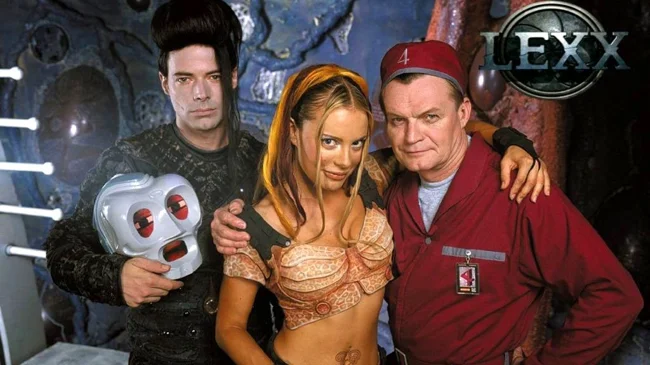
If you imagined that madness took shape in the depths of space, its name would be Lexx. This German-Canadian sci-fi trip will forever remain the most shameless, provocative and reckless television sci-fi of the 1990s.
The plot centers on a group of losers who accidentally become the crew of the living starship Lexx, a giant insect-like ship capable of incinerating entire planets. Their captain is a cynical and slightly inadequate adventurer. His crew includes an immortal cyborg killer with a poetic soul, a female hybrid with reptilian blood, and a robot head with a sarcastic sense of humor. Together, they raced around the Universe for four seasons, encountering absurd cults, perverted alien regimes, and their own ridiculous passions.
"Lexx" is a psychedelic cocktail of black humor, eroticism, philosophical hints, and outright nonsense. Some viewers watched it, captivated by its crazy aesthetics, while others said that it was such terrible bad taste that it was impossible to tear yourself away.
3. "First Wave" (1998-2001) 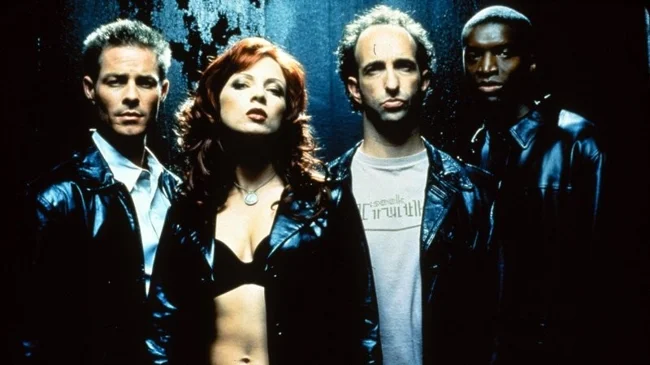
At the turn of the millennium, when the world did not yet know about social networks and fake news, but already felt the breath of the digital age, one of the most atmospheric science fiction series, "First Wave", was released. Behind its creation were Chris Brancato (the future master of genre cinema, who gave the world "Narcos") and Francis Ford Coppola himself, whose producing genius added cinematic depth to the project.
The plot unfolds around an ordinary man, Cade Foster (Sebastian Spence), who accidentally learned the terrible truth: the Earth is already occupied. Aliens, disguised among humans for centuries, conduct experiments on them, preparing for a full-scale invasion. And all this was predicted by Nostradamus.
Together with the paranoid but brilliant hacker Eddie (Rob LaBelle), obsessed with conspiracy theories, Cade sets out to find the lost quatrains of the prophet, which contain the key to saving humanity. Their weapons are not lasers or blasters, but knowledge obtained in the dark corners of the Internet and presented in the form of articles for the mysterious online tabloid Paranoid Times.
The series cleverly played on the fears of the late 90s: man-made disasters, digital surveillance, secret societies. This project did more than just anticipate the era of fakes and conspiracy theories.
Despite the fact that the series was canceled after the third season due to low ratings, it later acquired a cult status.
4. «The Far Side of the Universe» (1999–2003) 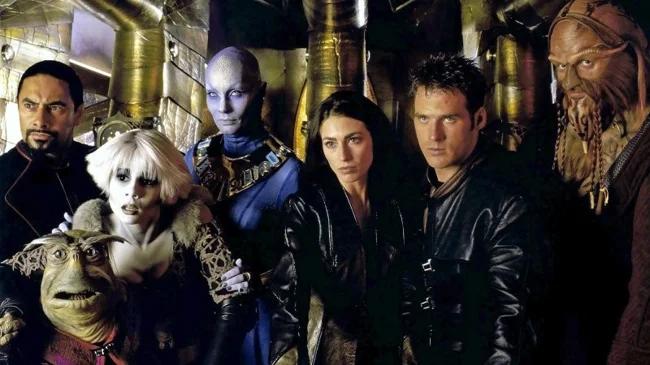
This American-Australian sci-fi cocktail, created by the team of the series «Sea Odyssey» and Jim Henson, who created «The Muppets», absorbed all the best from the cult series of the 90s — the epic scope of «Babylon 5», the spirit of adventures of «Star Trek» and the daring style of «Lexx»
John Crichton (Ben Browder), an ordinary Earth astronaut who one not-so-good day falls into a wormhole and finds himself at the other end of the Universe. There are no friendly aliens from NASA here, but only a motley crew of space outcasts: the militant warlord Irene Sun, the philosophizing warrior D'Argo, the mysterious priestess Zhaan and the witty and extremely unstable robot android Pilot. And also Moya, their living ship, huge, intelligent and in its own way touching.
For four seasons, Crichton and his team rushed around space, got entangled in political intrigue, saved worlds and tried to find their way home. The series skillfully balanced between drama and comedy, space battles and personal dramas. And when it was suddenly canceled, fans finally got "Battle for Peace," a full-length finale that put an end to this crazy odyssey.
5. "Star Trek: The Next Generation" (1987-1994) 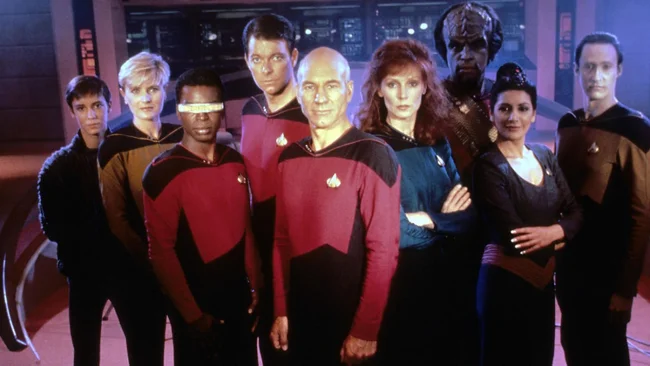
Every era has its own "Star Trek." For many millennials, their acquaintance with the legendary saga began with this series, at a time when Patrick Stewart had not yet become the iconic Professor Xavier, and his captain Picard - an icon of Internet memes.
The series was created by Gene Roddenberry himself, the founding father of the Star Trek universe, giving the world a new round of space adventures. The Enterprise crew plied the unimaginable expanses of the Universe, and thanks to modern (at that time) special effects, viewers could fully experience the scale and depth of this fantastic odyssey.
6. Babylon 5 (1994–1998) 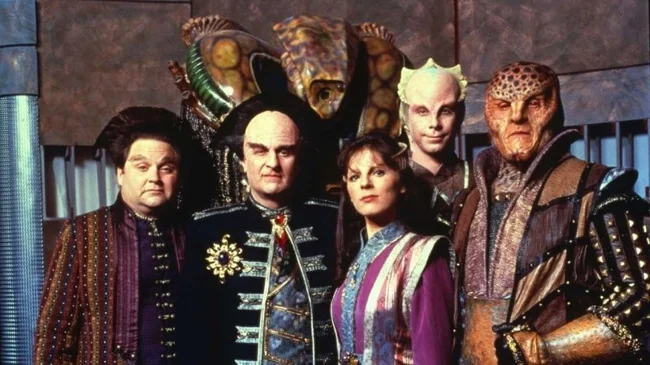
This is an epic space saga, one of the most grandiose television projects in the history of science fiction. Its creator, the famous writer and screenwriter J. Michael Straczynski, conceived not just a story about distant stars, but a complex, multi-layered universe where politics, diplomacy and the fates of entire civilizations intertwine in a whirlwind of intrigue.
Babylon 5 is the melting pot of the galaxy, a place where ambassadors from warring races converge, behind-the-scenes deals decide the fate of worlds, and every decision reverberates with millennia-long consequences. Unlike many space operas, this series was not afraid to be smart, cruel and philosophical. In it, every detail, every line is carefully planned and verified, part of a grand puzzle that comes together when watching all the seasons.
In the 1990s, Babylon 5 blew viewers' minds, turning upside down ideas about what a science fiction series could be. For many, it became not just entertainment, but a revelation.
